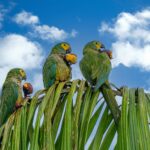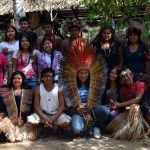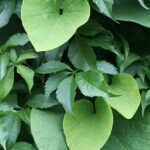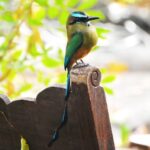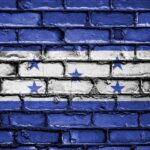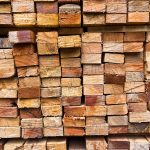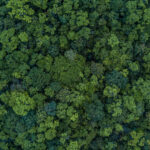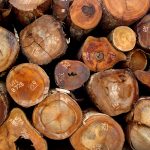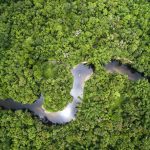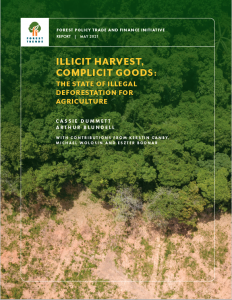
Despite its high vulnerability to extreme weather events, Honduras continues to clear its forests, seen as one of its best protections against climate change and intensifying storms and hurricanes. The biggest driver of deforestation in Honduras is shifting agriculture, responsible for nearly three-quarters of all tree loss, with cattle ranching being a top culprit.
Storms like Sara have been wreaking havoc across Honduras in part because the country continues to lose its forests, considered one of its best defenses against climate change-related events. The loss of vegetation cover has rendered the land unable to absorb excess water, worsening the impacts of floods that destroy homes, crops and entire communities.
This World Bank/ FAO report describes smallholder coffee farmers in Honduras and Guatemala which operate in highly fragmented, informal value chains where thousands of small producers and intermediaries make traceability and verification extremely difficult. Export systems rely heavily on informal intermediaries, many of whom keep limited records, making it challenging for exporters to verify farm-level information or prevent the mixing of coffee from unknown or non-compliant sources. Institutional weaknesses—including lack of coordination among government agencies responsible for land-use monitoring, forest oversight, and agricultural extension—create gaps in the systems needed to detect or prevent illegal land-use change. In both countries, producer registries are incomplete, and the absence of unified digital traceability platforms leaves room for errors, misreporting, or deliberate manipulation of origin data. These systemic vulnerabilities increase the risk that coffee exported from the region could include beans from farms with unclear land-use histories, undermining compliance efforts and complicating enforcement mechanisms.
Latin America consistently has the most documented murders of land and environmental defenders – 85% of cases in 2023. Lethal attacks against defenders were concentrated in four key countries that accounted for more than 70% of murders: Brazil, Colombia, Honduras and Mexico. Colombia is the world’s deadliest country for land and environmental defenders, with 79 murdered in 2023 – 40% of all reported cases. With the same number of murders as Mexico but less than a tenth of population, Honduras emerged as the country with the most killings per capita in 2023.
Approximately 436 million lempiras (16 million euros) will be invested in activities of the VPA-FLEGT Forest Alliance in Honduras. Restoration, reforestation, ecotourism, innovation, law enforcement, forest fire prevention, among others, will be promoted.
Remote sensing by satellite shows that 15-30% of annual deforestation in Nicaragua, Honduras and Guatemala can be attributed to the movement of cocaine alone, the paper says. Half of Central America’s resident and migratory bird populations have fallen since 1970 and deforestation is a key driver of that decline.
Original paper can be accessed here: Intersection of narco trafficking, enforcement and bird conservation in the Americas | Nature Sustainability
Honduran President Xiomara Castro launched a $769.6 million initiative to combat deforestation by 2029, urging legislative reforms and community involvement to protect the nation’s precious forests and biodiversity.
“The Honduran Parliament must reform the Penal Code to impose stricter penalties for environmental crimes,” President Castro emphasized during her speech. Her administration has already invested 1.6 billion lempiras ($64.8 million) since her tenure began, focusing on environmental protection efforts that have yielded notable successes in areas such as Lake Yojoa, the Río Plátano Biosphere, and the protected regions of the Cajón Basin.
According to Global Canopy, US$6.1 trillion in funding was provided to the 350 companies with the greatest risk exposures to tropical deforestation by some 150 financial institutions in 2023.
Through this exposure, land conversion presents numerous supply-chain risks to firms, namely:
- The reputational risks posed by adverse media (exacerbated further if linked to any human-rights abuses in the context of land conversion).
- The legal risks represented by increasing regulatory and legislative pressures on companies and financial institutions to prevent deforestation.
- The physical risks present, given that most bank-financed businesses and commercial services ultimately depend on natural capital and resources directly or through their supply chains. Aggressive consumption of resources reduces their availability in the long term, undermining sustainable development and creating economic instability. Indeed, the World Economic Forum (WEF) has estimated that at least 50 percent of global GDP is reliant on nature and warned that the impacts of climate change would significantly destabilise global trade.
In Honduras, oil palm gained traction as a crop in 2014, when the former president Juan Orlando Hernández invested almost $72m (£57m) in loans and grants to incentivise its cultivation.
The problem is that the extensive cultivation of oil palm has not only proved to be lucrative, but also poses a risk to the environment.
Besides the environmental problem, illegal oil palm crops are also used by drug traffickers in Honduras and Latin America, supporting laundering and transportation.
According to Frances Thomson, Latin America specialist in the Centre for the Study of Illicit Economies, Violence and Development, agribusiness is now essential to the drug economy, fulfilling multiple roles.
The region of the Moskitia on the border between Honduras and Nicaragua is one of Central America’s last great wildernesses, a paradise of pristine ecosystems and biodiversity. But today, the jungle of the Moskitia is dying. And it is organized crime that is killing it. First came the drugs, as traffickers turned the region’s coasts and forests into a cocaine corridor. Then came the traffickers themselves, financing invaders that are clear-cutting thousands of hectares of forest and fencing off vast tracts of land with barbed wire and armed guards.
The region’s Indigenous Miskito people have been left trapped in desperate poverty, and are caught between the traffickers and an indifferent state. But some are now preparing to fight back.
For the past 11 years, Global Witness has documented and denounced waves of threats, violence and killings of land and environmental defenders across the world, and 2022 marks the beginning of our second decade documenting lethal attacks. The world has changed dramatically since we started documenting these in 2012. But one thing that has not changed is the relentlessness of the killings.
Last year, at least 177 defenders lost their lives for protecting our planet, bringing the total number of killings to 1,910 since 2012. At least 1,390 of these killings took place between the adoption of the Paris Agreement on 12 December 2015 and 31 December 2022.
New Global Witness report shows nearly 90% of all environment-linked killings in 2022 were in the region, driven by land disputes, armed conflict and extractive industries.
Colombia was found to be the deadliest country in the world, with 60 deaths in total last year – more than a third of all killings globally. These figures come despite the country’s move in October 2022 to ratify the Escazú Agreement, a legally binding regional treaty to protect environmental defenders, and is almost double the number of killings reported in the country in 2021.
Other vulnerable countries in the region where Brazil, where 34 defenders lost their lives, compared to 26 in 2021, and Mexico, although the 31 murders recorded in the country last year were a drop from 54 in 2021, when it was the country with the highest number of killings. With 14 land- and environmental-linked murders recorded, Honduras was the country with the world’s highest per-capita killings. Mexico has ratified the Escazú Agreement, while Brazil is yet to do so, having only signed the treaty at its creation in September 2018; Honduras has neither signed nor ratified the agreement.
A network of illicit roads slicing through the Moskitia, an Indigenous territory rich in tradition that stretches from the Caribbean coast deep into Honduras and Nicaragua and encompasses the Moskitia forest, a crucial biological corridor the size of New Jersey that weaves together four natural reserves.
Underpinning much of the destruction are drug traffickers and their associates – bankrolled by cocaine consumption in the US and Europe – who are building the roads and laundering vast sums of money through cattle ranching and land speculation.
Loggers and ranchers had already opened up the first tracts of the road, clawing into Indigenous Pech territory and the buffer zone of the Rio Plátano biosphere, a Unesco world heritage site. But, as trafficking intensified, one narco faction pushed deeper into the forest and installed a heavily guarded gate. When that clan fell, others bulldozed through to the Tawahka Asagni biosphere.
This article provides background on the EUDR and potential for technology to monitor deforestation rates and help farmers provide information about their farming practices. A pilot in Indonesia is described, as well as potential future projects in Bolivia, Colombia and Honduras.
Almost half of the 401 murders of human rights defenders recorded in 2022 were against people involved in the defense of land and environment, according to the most recent report by the organization Front Line Defenders.
Latin America is the region with the highest number of cases of recorded violence against defenders.
The countries with the most cases are Colombia, Mexico, Brazil and Honduras.
- A timber trade agreement that aims to ensure Honduras exports only legally harvested timber products to the European Union is the first of its kind to go into force in the Americas.
- Under the framework, a timber legality assurance system currently under development will be the backbone of licenses for the export of legal timber and timber products.
- Indigenous and agroforestry groups that took part in negotiations leading up to the agreement say they hope the deal will spur action to address illegal logging and land grabs affecting forests and communities.
Tegucigalpa, 12 septiembre 2022-
Today, the first meeting of the Joint Implementation Committee (JIC) that oversees the VPA took place in the capital of Honduras, Tegucigalpa, getting the implementation of the VPA officially of the ground. Honduras is one of 15 countries that are implementing or negotiating a VPA with the EU. Honduras is the first country in Latin America where the VPA is in its implementation phase.
The VPA is an international legally binding trade agreement set to address the root causes of illegal logging and promote the sustainable use of forests to ensure trade in legal timber and contribute to tackling deforestation, forest degradation, and climate change. The deal also includes strong commitments on the rights of indigenous and Afro-descendant peoples in relation to forests. Despite being a bilateral trade deal, the obligations apply to all Honduras’ export markets as well as its domestic market, thereby ensuring coverage of the entire forest sector and avoiding any circumventions.
Today marks the entry into force of the EU–Honduras voluntary partnership agreement (VPA) on forest law enforcement, governance and trade (FLEGT). This trade agreement aims to provide a legally binding framework that ensures that all timber and relevant timber products imported from Honduras to the EU are legally sourced. It also aims to strengthen the enforcement of forest law, governance, accountability and transparency in Honduras.
Deforestation in Honduras has many causes. Organized crime, narcotrafficking, illegal logging, and forest fires all greatly harm the environment.
Click here to access the Global Illegal Logging and Associated Trade (ILAT) Risk assessment tool and to download the Forest Trends User Guide describing the functionality of the ILAT Risk Data Tool.
Click here to access the Cattle Data Tool.

